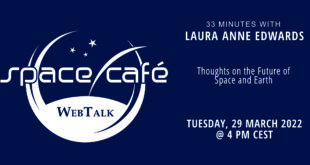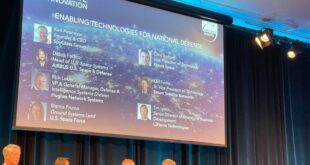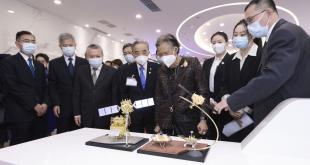by Viktoria Urban

The Space Café WebTalk “33 minutes with Laura Anne Edwards – Thoughts on the Future of Space and Earth” took place on Tuesday, 29th March 2022.
Laura is an innovation catalyst, named a 2021 Top 50 Leader in Space Tech. Laura is a NASA Datanaut, a core member of the Oxford Space Initiative, TED Resident, Board Member / Crowdfunder at UC Irvine, Living Systems Collaboratory and Buckminster Fuller Design Science Studio Resident. She served on the State Department Advisory Committee for Technology and Innovation / Public-Private Partnerships and was named in 2019 as a “Woman to Watch in Innovation”. Laura consults and speaks on sustainable innovation, systems thinking, diversity of thought, the potential for true AI-Human collaborations and humans thriving in space.
Edwards starts by explaining that a datanaut is someone participating in a NASA outreach program which emphasizes women with some attachment to data. The group has about 300 members around the world and has extraordinary access and insights into the data flow process. As informal emissaries, they have privileges that enable them to do self directed projects.
Edwards then goes on to talk about the Oxford Space Initiative, which aims to engender a global conversation around the ecosystem, including space, commerce, and governance. The goal of the initiative is to spur research into the social sciences as that expertise, and that research funding hasn’t been there recently, she says.
She also thinks it is important to decide whose vision of space we want. The eccentric billionaires’, the military’s, the engineers’ or scientists’? Edwards says that a global dialogue is very important on the matter and she does not want space matters decided by a very few people in a very few institutions as space belongs to all of us.
“…in all of human history, we don’t have a great track record of thinking through any possible consequences…”
She thinks that space is relatable to all humankind as everybody on Earth can look up to the sky. Countries can make strategies about what our shared space future is, she says. Edwards acknowledges that there are unprecedented amounts of information about the Earth and that is just the beginning of the tie between space, commercial space and sustainability. She explains that another side to sustainability and space commerce is the conscious investment into “dual-use technology” as many things that are needed on a technical, and on a policy, level to address the opportunities, challenges and the moral imperatives of climate, for example, are also the technologies and expertise and policy that will yield benefits in space. Of course, different sectors and different participants of those sectors have a different levels of moral imperative.
Edwards brings people together to have an interdisciplinary dialogue and research, which she calls design thinking for space. Design thinking should focus on humans now as we have overcome massive engineering challenges in the space sector but we have not been committed to putting the human factor back into the conversations of planning for a space future that supports Earth and the betterment of humanity to the same level.
She concludes by saying that the International Space Station is an astonishing example of human cooperation despite tensions on Earth.
To listen to the Space Café WebTalk’s insights, you can watch the full program here:
Viktoria Urban, contributing Editor at SpaceWatch.Global: After graduating as a Journalist from Edinburgh Napier University, I am now doing an Astronomy and Planetary Science degree at The Open University (Scotland) which has enhanced my already existing love and enthusiasm for space. I am also a member of and a volunteer for several societies both in Hungary and in the UK and write online content on space for multiple companies as well. I hope my science communication will encourage many to find a job in the space sector, whatever their background and highlight important issues to ensure a sustainable space environment for future generations.
 SpaceWatch.Global An independent perspective on space
SpaceWatch.Global An independent perspective on space



